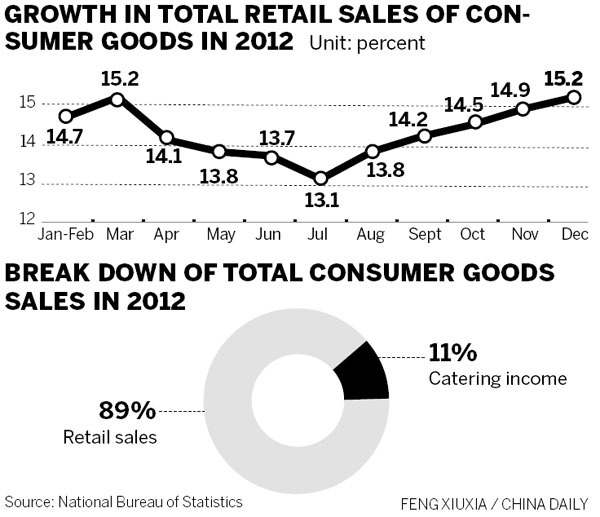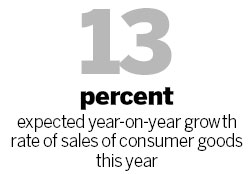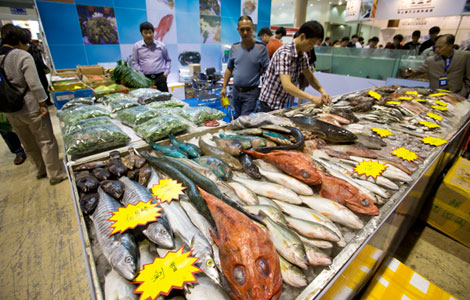

Private consumption, rather than public funds, to drive up spending
The annual growth in sales of consumer goods is expected to slow this year, with growth mainly driven by private consumption rather than public spending, according to a new report.
|
 |
The sales of consumer goods will grow 13 percent year-on-year, lower than in previous years, according to the 2013 China Consumer Market Development Report released on Thursday by the department of consumer economics at the Chinese Academy of International Trade and Economic Cooperation of the Commerce Ministry.
Zhao Ping, deputy director of the department, said the estimated slowdown reflects the fact that consumption will mostly be supported by private consumers rather than by public funds.
She said that fewer government stimulus policies will back consumption this year, and in addition, the government measures to crack down on corruption - banning lavish banquets and spending on luxury products using public funds - will curb overspending and the sales of luxury goods.
The report said, the growth in retail sales of consumer goods will mostly be backed by demand from private consumers and a rise in incomes.
The consumption of food and beverage products will remain strong, boosted by the policies to increase incomes for lower and medium-income earners - the mainstream buyers for this sector.

Sales of clothing products will also grow rapidly, with more transactions made at online and more exposure expected for Chinese brands, a trend inspired by the country's first lady, who favors domestic designs rather than international brands for her diplomatic trips, the report said.
The report also found that high-end caterers have suffered the most from the government's policies to crack down on waste and lavish spending.
In Beijing and Shanghai, the revenue of high-end restaurants dropped 35 percent and 20 percent year-on-year, respectively, during the Spring Festival period.
The report said that about 80 percent of the waste in the catering industry stemmed from public and business spending.
But it also said that the impact of the policies on the restaurant industry is only temporary, encouraging high-end and medium-level caterers to target new customers.
Due to the government's influence on private spending, luxury liquor brands such as Wuliangye and Moutai have also been affected and demand for high-end liquor will be severely hit, said Zhao.
However, the report estimated that average liquor consumption will continue to grow.
Meanwhile, the growth of the luxury market on the Chinese mainland slowed to 7 percent in 2012 from 30 percent in 2011, the lowest level since 2006.
In 2013, the consumption of luxury brands, particularly in the male luxury sector, will remain low.
The fastest growth will be seen in the furniture and decoration materials sector, which is expected to increase 20 percent, supported by demand from second- and third-tier cities.
The telecom and jewelry sectors, which grew at the fastest rate since 2011, have seen weaker sales since last year, despite a recent rebound in jewelry sales due to the lower prices of gold.
The growth of auto and electronic appliances sales - two sectors which rely heavily on stimulus policies - is also expected to remain sluggish this year.
Urban consumption, which accounts for 80 percent of China's overall consumption, is expected to grow at a slower pace than consumption by rural residents.
 HK's new cruise terminal receives luxury liner
HK's new cruise terminal receives luxury liner
 Future points to carbon trading
Future points to carbon trading
 Seafood businesses flounder amid spending cut
Seafood businesses flounder amid spending cut
 Equities slump amid slow-growth estimates
Equities slump amid slow-growth estimates
 Auto show opens with much fanfare in Xi'an
Auto show opens with much fanfare in Xi'an
 Sunnylands summit fuels Chinese tourism interest
Sunnylands summit fuels Chinese tourism interest
 'Palace on wheels' on sale for $3.13m in Dubai
'Palace on wheels' on sale for $3.13m in Dubai
 Fortune smiles on Chengdu as forum concludes
Fortune smiles on Chengdu as forum concludes